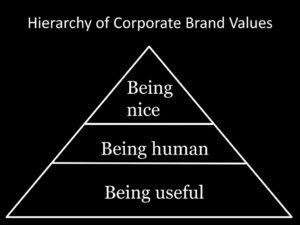Chapter 1: Introduction to Ethics

Ethics is defined as a collection of moral principles of values which guide an individuals, groups, or institutions behavior. It is generally accepted most decisions will require some level of ethical judgement. Every participants in a situation will bring a different set of expectations, values, and other facets to navigate. Very often, a code of ethics will include the company’s mission, values, and principles which will align with the professional expectations and standards (Freedom Learning Group).
A code of ethics usually involves six universal moral values, which clarifies expectations. These elements include, fairness, respect, caring, responsibility, trustworthiness, and good citizen behavior. Each of these components will likely mean something different to the individual, group, or organization. As the textbook progresses, it will focus on each one of these components and its alignment with a specific element of ethical decision making. This first chapter acts as an overview of the main types of ethics, examples of codes of ethics, and other introductory information (Brown, 2022).
It is possible to confuse Code of Ethics with Code of Conduct. They are similar concepts, but not the same. Both are to manage and guide behavior. However, where ethics is used to guide judgments and more mental activities, conduct is more related to the actions of a person. It may include being on time and being honest (Hayes, 2023). A code of ethics is how we as citizens can hold companies accountable for their actions and upholding their mission. A code of ethics helps all of us.
Main Types
There are three types of ethics, including compliance based code of ethics, values-based codes of ethics, and also code of ethics among professionals. There’s another factor which is becoming integral in ethics as well: climate change.
Compliance-Based Code of Ethics
 Laws regulate issues such as hiring policies and safety standards. Compliance-based codes of ethics set parameters for conduct but also determine consequences for not adhering to the policies (Hayes, 2023). Compliance-based codes of ethics are used to enforce laws, regulations, policies; often to prevent liability and other legal issues should they not be followed. In some situations, a compliance officer may be beneficial to verifying these rules are being followed. As you may have surmised, it is very clear if someone is or is not following the ethical guidelines (Hayes, 2023).
Laws regulate issues such as hiring policies and safety standards. Compliance-based codes of ethics set parameters for conduct but also determine consequences for not adhering to the policies (Hayes, 2023). Compliance-based codes of ethics are used to enforce laws, regulations, policies; often to prevent liability and other legal issues should they not be followed. In some situations, a compliance officer may be beneficial to verifying these rules are being followed. As you may have surmised, it is very clear if someone is or is not following the ethical guidelines (Hayes, 2023).
Values-Based Codes of Ethics
Meanwhile, a value-based code of ethics addresses a specific company’s unique core values. It can include outlining specific terms and definitions related to appropriate conduct. Additionally, this form of ethics may required more self-regulation.

Self-regulation means the individual is required to manage their own behavior, without significant oversight from a monitoring body, like a supervisor.
It is possible values-based codes of ethics will include both compliance components but also institutional values. For example, a department store may prioritize health and safety above profits; refusing connection with entities which do not have ethical guidelines or have inhumane practices.
Code of Ethics for Professionals
There are countless professional organizations with their own code of ethics. Review a couple of those listed below that pique your interest; as you progress through the course, you’ll be building your own code of ethics and these can function as a foundation.
- National Association of Social Workers Code of Ethics
- American Nurses Association Code of Ethics
- National Education Association Code of Ethics for Educators
- Ethical Principles of Psychologists, provided by American Psychological Association
- National Society of Professional Engineers Code of Ethics
- National Association of Realtors Code of Ethics
- Association for Computing Machinery Code of Ethics and Professional Conduct
- Law Enforcement Code of Ethics
- American Speech-Language-Hearing Association Code of Ethics
- World Health Organization Code of Ethics
- American Marketing Association Statement of Ethics
Check Yourself
References
Brown Jr., C. (2022). A great marketing textbook. Pressbooks. Retrieved on October 2, 2023 from https://pressbooks.pub/agreatmarketingtextbook/chapter/reading-define-ethics/
Freedom Learning Group (n.d.). Code of ethics. Lumen Learning. Retrieved on October 2, 2023 from https://courses.lumenlearning.com/wm-organizationalbehavior/chapter/code-of-ethics/
HBS Online (2023). Introduction to leadership, ethics, and corporate accountability [Video]. YouTube. https://www.youtube.com/watch?v=XjiRF_6cvcA
Hayes, A. (2023). Code of ethics: Understanding its types, uses through examples. Investopedia. Retrieved on October 2, 2023 from https://www.investopedia.com/terms/c/code-of-ethics.asp

